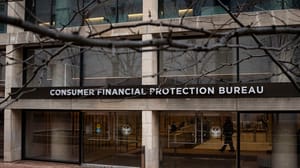Q&A: Crenshaw Says SEC to Assess Reg BI PerformanceQ&A: Crenshaw Says SEC to Assess Reg BI Performance
Staff continue to incorporate Reg BI compliance into the SEC's examination and enforcement processes; Commissioner Caroline Crenshaw believes this data will illuminate whether the rule is working as promised, or whether changes may be required.

The Securities and Exchange Commission’s Regulation Best Interest, a Trump administration rule, went into effect last June. But the Democratic Party platform indicated before the election that they might revisit the rule, saying, “We will take immediate action to reverse the Trump administration's regulations allowing financial advisors to prioritize their self-interest over their clients' financial wellbeing.” But many lawyers and consumer advocates believe it's more likely Reg BI itself stays in place, and they morph it into something with more teeth via further guidance and heavier enforcement.
 In a recent interview with WealthManagement.com, Commissioner Caroline Crenshaw said the next step will be to assess how Reg BI is performing, as the end of June will mark one full year of implementation. SEC staff continue to incorporate compliance into its examination and enforcement processes, and Crenshaw believes this data will illuminate whether the rule is working as promised, or whether changes may be required.
In a recent interview with WealthManagement.com, Commissioner Caroline Crenshaw said the next step will be to assess how Reg BI is performing, as the end of June will mark one full year of implementation. SEC staff continue to incorporate compliance into its examination and enforcement processes, and Crenshaw believes this data will illuminate whether the rule is working as promised, or whether changes may be required.
Crenshaw was confirmed to fill the seat left vacant by former Commissioner Robert Jackson last year. In a Q&A, Crenshaw, who was also one of WealthManagement.com’s 10 to Watch for 2021, detailed her thoughts on a number of issues the SEC may face, including the need for balance between the size of our public and private markets and the value of ESG-related disclosures. On Monday, acting Chair Allison Herren Lee asked commission staff to evaluate disclosure rules "with an eye toward facilitating the disclosure of consistent, comparable, and reliable information on climate change," and also ask for public input.
This interview has been edited for clarity and length.
WealthManagement.com: At the Consumer Federation of America’s Financial Services Conference, you talked about the importance of having a strong fiduciary standard of conduct. Is that possible with Reg BI as it stands?
Caroline Crenshaw: Dodd-Frank gives us the authority to do a uniform fiduciary standard, and Chairman Clayton decided not to go down that path. And so, right now we have sort of two separate standards. And I will say, regardless of whether you're an investor with a broker/dealer or an investor with an investment advisor, you should be getting, in my mind, the advice that is, for lack of a better word, in your best interest, right? You should be getting advice that's going to help you save for retirement with the fewest conflicts of interest possible with you, that's really going to not eat away at your investments over time because of the fees.
In terms of Reg BI itself and where we are, it's still early in the implementation process. It went into effect this summer, so we're obviously still looking at the impact that it is having or will have on the markets. I'm really interested in finding out whether Regulation Best Interest is actually going to result in investors getting the advice that is in their best interest and whether this is going to result in a change in portfolios over time, whether this is going to result in reduced conflicts of interest, and more disclosed conflicts of interests that are clearer. I think that's something that we need to evaluate.
WM: In the last few months, one question on Reg BI concerns whether it is more appropriate or even feasible to make changes via additional guidance, or whether more rule-making might be a possibility?
CC: We're really still at the point of understanding the impact that Reg BI is going to have on the market. And I think we really need to understand that well, before we know what potential next steps are going to be the most useful or most effective and the best steps for investors. There might be areas where we can provide guidance. If we find there's areas that need broader changes, that, under APA, might require rule-making.
WM: Turning to the new ad rule from the commission; in a public statement you mentioned that you felt that there was a “retreat from common sense elements” from the proposal in the final rule. What were those elements, and what changes might you hope to see going forward?
CC: The final rule carved out hypothetical performance for private fund investors, and I found that disappointing. Hypothetical performance does not reflect actual investments made or actual results achieved; it’s hypothetical performance. It's based on the benefit of hindsight, and therefore I worry that it could be perhaps too easy to harvest or cherry-pick data, particular data and a particular strategy, that would indicate certain performance that may never actually be able to be achieved by any investor.
So, for that reason, I worry that hypothetical performance is a place where investors (and, on the private fund side, accredited investors) could really be misled. And I worry with the expansion of accredited investors elsewhere, that perhaps accredited investors might be more confident in some of the performance than they ought to be, and that that could result in harm.
Another area that I would have liked the rule to cover is pre-review for advertisements. I think that's a way to ensure that they comply with the rule’s requirements before the advertising has published. In my mind, it's much easier to catch problems like this on the front end than it is once it’s already out there, once investors have seen it, once they've already invested and the harm has been done.
I think that would have been a place where we really could have added value, and we'll just need to monitor the implementation and we'll see if there's problems there and whether we need to do anything about it.
WM: Could you tell me a little bit more about your concerns about the accredited investor definition. What about the larger concern about access to private markets or investment protection in private markets?
CC: So for me, in looking at the accredited investor definition, I think I have concerns about how we've expanded it. I'm not sure that the in-place thresholds are a good and accurate measure of whether an investor can withstand the risks of the types of investments that are intended for accredited investors. If the measure is wealth, I think we should have considered keying the wealth threshold to inflation, something that the rule did not do. If we're thinking about the ability to tolerate risk, I think we could have thought about defining accredited investors as an investor with a certain level of risk tolerance and ability to withstand certain losses, especially given that the investment opportunities that target accredited investors often come with more risk of total investment loss. So I think those are areas that we certainly should have thought about when looking at the accredited investor standard.
In terms of the public/private market piece, I certainly haven't heard a whole lot of investors banging down my door to have more access. What I do hear are private offerings looking for more access to investors. So I think in a way it has been reframed, that investors are missing out on this access, when really it's a lot of the private markets looking for more investor access.
WM: What points to an investor's ability to tolerate the kind of risks that you might see in those scenarios?
CC: I think that part of what you raised there is that we need more information. In the private markets, there’s a lack of information in terms of how investors are doing and how these markets are performing. So, in order to decide the appropriate risk and tolerance and percent of wealth or income for the accredited investor standard, I think we need to start with a closer look at our private markets. We have data on some of them, but the Regulation D market in particular is one where I really think the agency could look at.
WM: What are your thoughts on the likelihood of SEC movement on ESG-related disclosures and what form it may take at the commission level?
CC: Acting Chair Lee has created a policy advisor position specifically on ESG issues. And I think that highlights the importance. To me, it's important because investors, including the single largest asset managers, have shown us that this is information that is important for them in their investment-making decisions. Currently, many companies are disclosing some information, but the metrics vary so greatly that it’s impossible to sort of have any comparable sense of what these disclosures mean.
WM: In your initial testimony before the Senate committee, you talked about your work with the JAG Corps. How does that affect the work you do with the commission?
CC: My military service is something that's extremely important to me. It makes me focus on when soldiers are going overseas and losing their lives for our country, and that's very grounding to me in many ways. But in working with them every day, I also see the impacts our policies have on investors, and particularly on service members. In talking with them, I understand where their inclination is in investing in certain products, and I understand the struggles they're having when they're trying to think about what to do for retirement.
So, it really makes me keep in mind every day, in our policies, both the importance of facilitating capital growth, and making sure to give them the opportunities, but making sure that the appropriate protections are in place and making sure that the investors really understand and are able to make the best decisions possible, (including) putting parameters such as Reg BI in place to make sure that they're getting the best advice to make the best decisions possible.
So that’s a piece of it; I think the other piece of it for me is the military every day highlights the importance of leadership. And so, taking this position for me (and) having that background, that specific leadership training that the military provides, has been instrumental. It's just made me think about this position in a different way. It makes me want to put the staff, the team, the investors, everybody, companies first; it just really gives you a different perspective.







